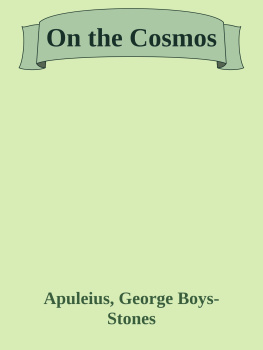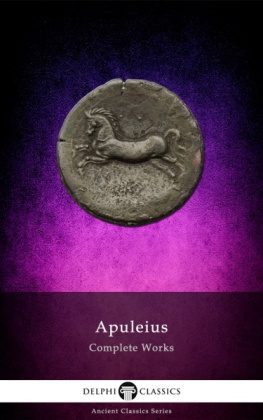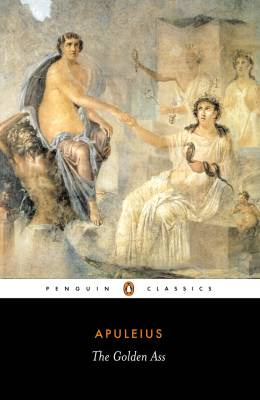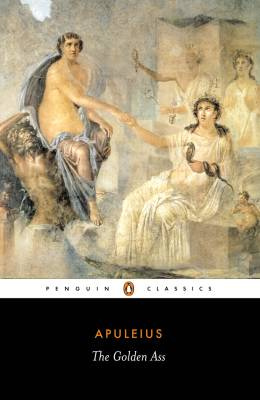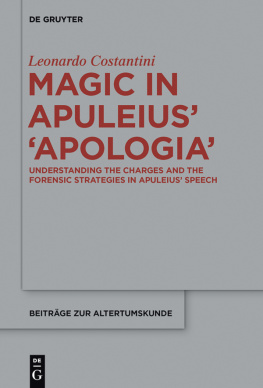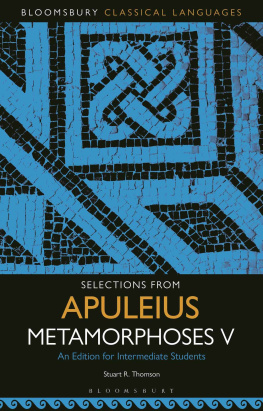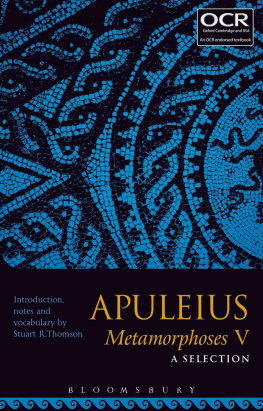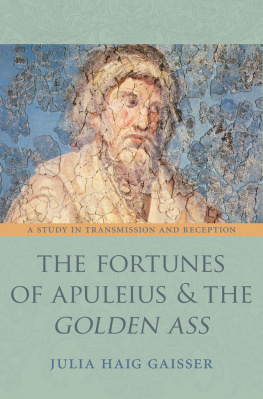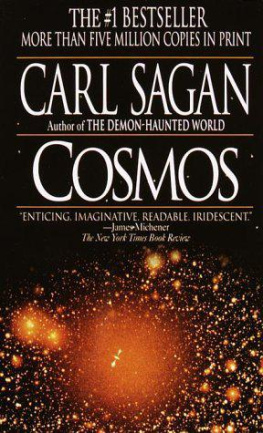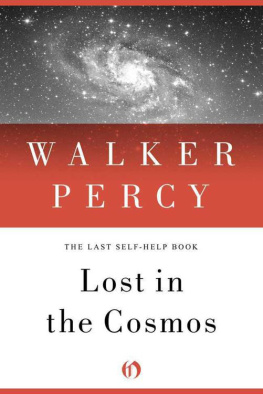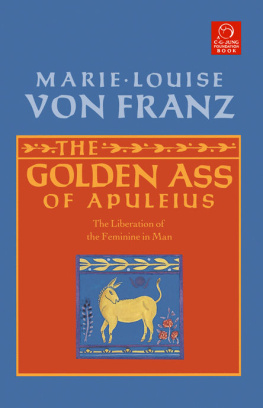Apuleius - On the Cosmos
Here you can read online Apuleius - On the Cosmos full text of the book (entire story) in english for free. Download pdf and epub, get meaning, cover and reviews about this ebook. genre: Detective and thriller. Description of the work, (preface) as well as reviews are available. Best literature library LitArk.com created for fans of good reading and offers a wide selection of genres:
Romance novel
Science fiction
Adventure
Detective
Science
History
Home and family
Prose
Art
Politics
Computer
Non-fiction
Religion
Business
Children
Humor
Choose a favorite category and find really read worthwhile books. Enjoy immersion in the world of imagination, feel the emotions of the characters or learn something new for yourself, make an fascinating discovery.
- Book:On the Cosmos
- Author:
- Genre:
- Rating:3 / 5
- Favourites:Add to favourites
- Your mark:
- 60
- 1
- 2
- 3
- 4
- 5
On the Cosmos: summary, description and annotation
We offer to read an annotation, description, summary or preface (depends on what the author of the book "On the Cosmos" wrote himself). If you haven't found the necessary information about the book — write in the comments, we will try to find it.
On the Cosmos — read online for free the complete book (whole text) full work
Below is the text of the book, divided by pages. System saving the place of the last page read, allows you to conveniently read the book "On the Cosmos" online for free, without having to search again every time where you left off. Put a bookmark, and you can go to the page where you finished reading at any time.
Font size:
Interval:
Bookmark:
Apuleius, Onthe Cosmos
Thissite presents a working draft of a new English translation of Apuleius DeMundo. You can view it alongside the Aristotelian (commonly, but for these purposes confusingly, also known asDe Mundo), presented here in a new English translation, designed to givethe best possible sense of where the texts most diverge from each other. TheLatin and Greek texts are also available to view in parallel with each other,and with the translations.
Clickhere to select which text(s) you would like to see:
[Aristotle], On the Cosmos (English)
[Aristotle], (Greek)
Apuleius, De Mundo (Latin)
Apuleius, On the Cosmos (English)
[Aristotle], On the Cosmos | [Aristotle], Peri Kosmou | Apuleius, De mundo | Apuleius, On the Cosmos |
Philosophy has often struck me as a godlike and divine thing, Alexander, especially in cases where it alone can elevate us to the contemplation of things that are real, and concerns itself with knowing the truth about them. Others keep their distance from it because it is too elevated, too vast. But philosophy is not afraid of this subject, and does not think itself unworthy of what is more beautiful than anything else. On the contrary, it supposes that it has close affinity with it, and that it is especially suited to learning about these things. We cannot reach heaven physically, or leave the earth in order to inspect the holy country there [10] as the foolish Aloiadai once thought they could. But thanks to philosophy, the soul, led by the intellect, is elevated and transported; it finds itself on a tireless journey, and in the regions of the mind it surveys things that normally stand far away. It easily recognises what is akin to it, I suppose, and the souls divine eye grasps things that are divine and delivers them as prophetic revelation to humans. | , , , , , , . [391 a10] , , , , , , , , , , , . | [ Proem ] Consideranti mihi et diligentius intuenti , et saepe alias, Faustine fili , uirtutis indagatrix expultrixque uitiorum , diuinarum particeps rerum philosophia uidebatur , et nunc maxime, cum naturae interpretationem et remotarum ab oculis rerum inuestigationem sibi uindicet . Nam cum ceteri magnitudine rei territi , eiusmodi laborem arduum et profundum existimarent , sola philosophia suum non despexit ingenium , nec indignam se existimauit , cui diuinarum et humanarum rerum disc[r] eptatio deferatur ; sed concinere [ accidere ] tam bonas artes et eiusmodi operam cum ingenuitate professionis suae credidit , et congruere istius modi curam talibus studiis et moribus . Nam cum mundum homines eiusque penetralia corpore adire non possent , ut terreno domicilio < relicto > illas regiones inspicerent , philosophiam ducem nancti eiusque inuentis inbuti , animo peregrinari ausi sunt per caeli plagas , his itineribus quae exploratione acuminis sui peruia sapientiae solis cogitationibus uiderant , ut, cum ipsius interualli condicione a mundi uicinia natura nos secretos esse uoluisset , inmensitati tamen eius uolucrique curriculo cogitationum nostrarum nos pernicitas intimaret ; facillimeque ea , de quibus origo eius est, anima diuinis suis oculis aspexit , agnouit , aliis etiam eius scientiam tradidit , ueluti prophetae quidam deorum maiestate conpleti effantur ceteris , quae diuino beneficio soli uident . | INTRODUCTION [285] When I have been reflecting, and delving deeper, it has often struck me, Faustinus , my son, that philosophy is the pursuit of virtue and scourge of the vices: it participates in things divine. That is especially true in the present case, since the ability to interpret nature and to investigate things that are far beyond what we can see is something that philosophy claims for itself. Others quail at the magnitude of the subject: they think that the work this sort of thing requires is difficult and deep. Only philosophy does not doubt its own ability, or think itself unworthy, [286] because to philosophy is given judgement of matters divine as well as human. On the contrary, in fact: it believes that these beautiful sciences, and the work they involve, are consistent with its calling, that such an occupation suits its interests and inclinations. [287] Human beings cannot physically visit the cosmos and its interior, cannot leave behind their terrestrial home to inspect those regions; but taking the lead of philosophy and steeped in its discoveries they have dared to travel intellectually through the regions of heaven, taking roads which their own incisive investigation showed them to be passable only in thought and for the wise. So, although nature wanted our distance from the cosmos to keep us away from its neighbourhood, [288] our agile thinking gains us an acquaintance with it, with its size and its careering circuits. The mind possesses godlike eyes which can easily make out and recognise the well-springs of the cosmos, and the intellect passes this knowledge on to others [acting] just like prophets, who are filled by the majesty of the gods and reveal to everyone else what they alone, thanks to their divine gift, can see. |
And so it is: for the soul wishes to communicate to everyone whomsoever, as far as it can, everything it values. This is why some people have laboured to sketch for us the nature of some particular place, or the layout of some particular city, or the extent of a river, or [20] the beauty of a mountain all the kinds of thing people have done. Some of them talk about Ossa, some Nyssa, some the cave at Corycus , others whatever there happens to be in whatever place. One should pity them for their small-mindedness: they are struck with wonder at anything, and make a huge deal out of a trivial scene. This happens to them because they cannot see what is greater I mean the cosmos, and the larger components of it. If they really knew, they would not ever experience wonder at any of these things, [391b1] but everything else would seem trivial to them, and not worth a thing in comparison to its superiority. So let me speak and, as far as it is achievable, theologise about all these things, the nature and disposition and movement of each. And I think it is fitting for you, as the best of leaders, to engage with an account of the greatest of things, not to use philosophy to think about anything trivial, but to use its gifts to embrace what is best. | , , . [391 a20] , , , , , , , . , [391 b1] , . , , , . , , , , . | Quare et eos , qui unius loci ingenia nobis qualitatesque describunt , aut moenia urbis aut alicuius amnis fluenta aut amoenitates et magnitudines montium , alia multa descripta ab aliis , plerique studiose legunt : Nysae iuga et penetralia Coryci , et Olympi sacra, et Ossae ardua , alia huiuscemodi sola dumtaxat et singula extollunt . Quorum me miseret , cum tanto opere nec magnis et oppido paucis inexplebili admiratione capiuntur . Hoc illis euenire adeo non est mirabile , cum nihil maius suspexerint neque ad aliquid intenderint , quod maiore diligentia contemplandum esset . Ceterum si terrarum orbem omnemque mundum contemplari pariter aliquando potuissent , minus exiguas eius et singulas partes dignas laudibus credidissent , quibus esset uniuersitas conprehensa . Quare nos Aristotelen prudentissimum et doctissimum philosophorum et Theophrastum auctorem secuti , quantum possumus cogitatione contingere , dicemus de omni hac caelesti ratione , naturasque officia conplexi et cur et quemadmodum moueantur explicabimus . | There are people who find no shortage of avid readers for their descriptions of the character and qualities of a particular place: the walls of a city, a stream that flows somewhere, the beauty and grandeur of the mountains, and all the many other things they have described. They enthuse about the cliffs at Nyssa, the caves at Corycus , the shrines at Olympus, the steeps of [Mount] Ossa and so on, each and severally. [289] But I pity them: all their work, and it captures nothing of any size, nothing with the slightest claim on wonder. But it is not surprising that this is how it is with them: they have no inkling of anything greater, and do not attend to anything which a bit more effort would open to contemplation. If they could, just once, contemplate the terrestrial sphere, or the entire cosmos in the same way, it would convince them that the small individual parts which make up the whole were not so worthy of praise. Walking in the footsteps of Aristotle, the wisest and most learned of philosophers, and of Theophrastus, the writer, I shall, then, as far as my thought can achieve it, speak of the entire celestial system: I shall cover the kinds of things it includes along with their functions, and explain why and how they move. |
Font size:
Interval:
Bookmark:
Similar books «On the Cosmos»
Look at similar books to On the Cosmos. We have selected literature similar in name and meaning in the hope of providing readers with more options to find new, interesting, not yet read works.
Discussion, reviews of the book On the Cosmos and just readers' own opinions. Leave your comments, write what you think about the work, its meaning or the main characters. Specify what exactly you liked and what you didn't like, and why you think so.

